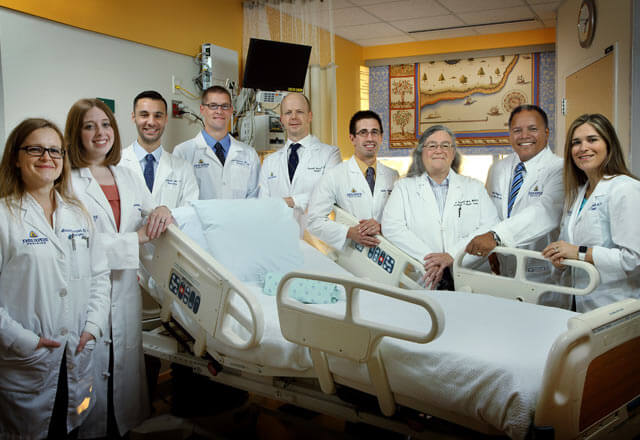Preliminary Surgery Program

Our General Surgery Training Program includes both categorical and preliminary residents. Our preliminary residency track attracts individuals from all over the world who desire broad training in general surgery without the expectation of completing their training in our institution. The total number of preliminary residents in our program is 18. Approximately three residents obtain a preliminary year and are destined to train fully in urology. About six preliminary residents are interested in both a PGY-1 and PGY-2 year in general surgery, and usually nine residents are interested in general surgery or in another specialty, such as anesthesiology or radiology, in which a year of broad general surgery training may be advantageous.
Because of the international background of the majority of our preliminary residents, our residents, faculty and staff members are exposed to the cultures of many nations, and as much as we offer an opportunity for these residents to enter U.S. graduate training, these individuals enhance our knowledge of their health care systems, training and culture. Every effort is made to ensure that our general surgery preliminary residents have an experience as similar to our categorical residents as possible.
In addition to our general surgery residents in both the preliminary and categorical surgical tracks, we have trainees from each of the surgical specialties—plastics and reconstructive surgery, three to four; otolaryngology–head and neck surgery, four to five; orthopaedic surgery, five; and neurosurgery, three—spend between three to six months training in general surgery during their first year.
Approximately half the time is spent on various general surgical services. Surgical specialty and subspecialty rotations include thoracic surgery, transplant and pediatric surgery. Rotations in the surgical intensive care units are offered during the first and second postgraduate years. During the first two postgraduate years, approximately 75 to 80 percent of the rotations are at The Johns Hopkins Hospital and 20 to 25 percent are at Johns Hopkins Bayview.
On-Call Schedule
In order to provide high-quality patient care and to comply with ACGME work hour requirements, our interns currently work day (six days) or night (five nights) shifts a week, with the majority of interns having Friday night and Saturday off together. Almost all services have additional professional affiliates who assist in the day-to-day management of patients. Postgraduate year 2 residents typically take 24-hour call every third or fourth night in the ICU, or once a week when on general surgery services. This system provides the best continuity of care while complying with the ACGME work hour restrictions.
Benefits
All residents are appointed fellows of the Johns Hopkins University School of Medicine and can take advantage of graduate student discounts on social activities and performing arts programs both on and off campus. Additional benefits include medical and dental care, disability and life insurance, liability insurance, lab coats, and two weeks of paid vacation for first-year residents and additional time for second-year residents. The stipend is competitive with other house staff salaries in the region.
Neurosurgery, Orthopedic Surgery, Otolaryngology-Head and Neck Surgery, and Urology
Residents in these training programs spend between three and six months in the Preliminary Surgery Program. They rotate through general surgery and surgical specialty services at The Johns Hopkins Hospital and Johns Hopkins Bayview. During their second postgraduate year, they begin training in their areas of interest.
International Medical Graduates
Medical graduates from international medical schools are encouraged to apply to the Preliminary Surgery Program. The Johns Hopkins University School of Medicine sponsors J-1 visas only for these positions for one to two years. Typical foreign graduates have been the best medical students from their countries who wish to acquire experience in the United States.
